Royal Malaysian Air Force
The Royal Malaysian Air Force (RMAF; Malay: Tentera Udara Diraja Malaysia (TUDM); Jawi : تنترا اودارا دراج مليسيا) was formed on 2 June 1958 as the Royal Federation of Malaya Air Force (Tentera Udara Diraja Persekutuan Tanah Melayu; تنترا اودارا دراج ڤرسكوتون تانه ملايو). However, its roots can be traced back to the Malayan Auxiliary Air Force formations of the British Royal Air Force in then colonial British Malaya. Today, the Royal Malaysian Air Force operates a unique mix of modern American, European and Russian-made aircraft.
| Royal Malaysian Air Force | |
|---|---|
| Tentera Udara Diraja Malaysia تنترا اودارا دراج مليسيا | |
.png.webp) | |
| Founded | 2 June 1958 [1] |
| Country | |
| Allegiance | Yang di-Pertuan Agong |
| Type | Air force |
| Role | Aerial warfare |
| Size | 15,000 personnel [2] 151 active aircraft [3] |
| Part of | Malaysian Armed Forces |
| Motto(s) | Malay: Sentiasa di Angkasa Raya "Always in the Sky" |
| Colours | |
| March | Malay: Perwira di Angkasa "Warriors in the Skies" |
| Anniversaries | 2 June |
| Engagements | |
| Website | www |
| Commanders | |
| Colonel-in-Chief | HM Sultan Abdulllah of Pahang |
| Chief of the Air Force | General Tan Sri Datuk Seri Ackbal Abdul Samad |
| Deputy Chief of the Air Force | Lieutenant General Dato Asghar Khan bin Goriman Khan |
| Insignia | |
| Roundel |   |
| Fin flash |  |
| Flag |  |
| Aircraft flown | |
| Fighter | Su-30MKM, F/A-18 Hornet |
| Helicopter | EC 725, Sikorsky UH-60 |
| Patrol | Super King Air |
| Trainer | BAE Hawk, MB-339, Pilatus PC-7 |
| Transport | Airbus A400M, C-130, CASA CN-235, 737 |
History
Early years
.JPG.webp)
The Malaysian air forces trace their lineage to the Malayan Auxiliary Air Force formations of the Royal Air Force (RAF) formed in 1934. They later transformed into the Straits Settlements Volunteer Air Force (SSVAF) and the Malaya Volunteer Air Force (MVAF) formed in 1940 and dissolved in 1942 during the height of the Japanese advance over Malaya. The latter was re-established in 1950 in time for the Malayan Emergency and contributed very much to the war effort.
On 2 June 1958 the MVAF finally became the Royal Federation of Malaya Air Force (RFMAF), this date is celebrated as RMAF Day yearly.
On 25 October 1962, after the end of the Malayan Emergency, the RAF handed over their first airfields in Malaya to the RFMAF, at Simpang Airport; it was opened on 1 June 1941, in Sungai Besi, Kuala Lumpur which was formerly part of Selangor and the national capital city. The first aircraft for the fledgling air force was a Scottish Aviation Twin Pioneer named "Lang Rajawali" by the then Prime Minister Tunku Abdul Rahman. Several Malayans serving with the Royal Air Force transferred to the Royal Federation of Malaya Air Force. The role played by RMAF was limited initially to communications and the support of ground operations against Communist insurgents during the Malayan Emergency. RMAF received its first combat aircraft with the delivery of 20 Canadair CL41G Tebuans (an armed version of the Canadair Tutor trainer). RMAF also received Aérospatiale Alouette III helicopters, to be used in the liaison role.

With the formation of Malaysia on 16 September 1963, the name of the air force was changed to "Tentera Udara Diraja Malaysia" or "Royal Malaysian Air Force". New types introduced into service included the Handley Page Herald transport and the De Havilland Canada DHC-4 Caribou. RMAF received Sikorsky S-61A-4 helicopters in the late 1960s and early 1970s which were used in the transport role. RMAF gained an air defence capability when the Australian Government donated 10 ex-Royal Australian Air Force (RAAF) CAC Sabre fighters. These were based at the Butterworth Air Base. After the withdrawal of British military forces from Malaysia and Singapore at the end of 1971, a Five Power Defence Arrangements (FPDA) agreement between Malaysia, Singapore, New Zealand, Australia, and the United Kingdom was concluded to ensure defence against external aggression. The RAAF maintained two Mirage IIIO squadrons at RAF/RAAF Station Butterworth, Butterworth Air Base as part of its commitment to the FPDA. These squadrons were withdrawn in 1986, although occasional deployments of RAAF aircraft continue.
Modernisation

With the withdrawal of British military forces, RMAF underwent gradual modernisation from the 1970s to the 1990s. The Sabres were replaced by 16 Northrop F-5E Tiger-IIs. A reconnaissance capability was acquired with the purchase of two RF-5E Tigereye aircraft. RMAF also purchased 88 ex-US Navy Douglas A-4C Skyhawks, of which 40 of the airframes were converted/refurbished by Grumman Aircraft Engineering at Bethpage into the A-4PTM ('Peculiar To Malaysia'), configuration (similar to A-4M standard). RMAF has traditionally looked to the West for its purchases, primarily to the United States. However, limitations imposed by the US on "new technology" to the region, such as the AIM-120 AMRAAM fire-and-forget air-to-air missile, has made RMAF consider purchases from Russia and other non-traditional sources. The 1990s saw the arrival of first the BAE Hawk Mk108/208 which replaced the T/A-4PTMs, followed by the MiG-29N/NUB in 1995 in the air superiority role and delivery of the F/A-18D Hornet in 1997 to provide an all weather interdiction capability. In 2003 a contract was signed for eighteen Su-30MKMs for delivery in 2007 to fulfill a requirement for an initial order of multi-role combat aircraft (MRCA). A requirement for a further eighteen MRCAs remains unfulfilled. RMAF is also looking for an AWACS aircraft, although no firm orders have been placed.
On 8 December 2005, four Airbus Military A400M aircraft were ordered to enhance the airlift capability. By March 2017 all Malaysian A400Ms were delivered to the customer.[4] In late 2006, the Government signed a contract to purchase eight Aermacchi MB-339CMs to add to the eight MB-339AMs already in service.
In March 2007, then-Deputy Prime Minister and Defence Minister Najib Razak notified the public that the MiG-29s would continue in service until 2010. Later that year, Najib announced the Nuri (Sikorsky S-61A-4) helicopter, in service since 1968 with 89 crew members killed in 15 accidents, would be phased out by 2012 and replaced by the Eurocopter EC725.[5] Deputy RMAF Chief Lieutenant General Bashir Abu Bakar told the media after opening Heli-Asia 2007, that tender assessment for the replacement of the Sikorsky S-61A-4 would occur in early 2008.[6] In June 2009, RMAF chief General Azizan Ariffin said that the air force would replace their MiG-29s with aircraft that have better agility and the capability to attack enemy forces.[7] At the 12th Defence Services Asia (DSA) exhibition 2010,[8] a Letter of Agreement (LOA) was signed for 12 EC725 helicopters to be supplied to the RMAF.[9] With that, EADS, (the European Aeronautical Defence and Space Company), has pledged 100 million Euros to set up a comprehensive helicopter centre in Subang for an aeronautical academy, training, simulation and a maintenance, repair and overhaul facility for the EC725 Cougar military version and the EC225 civilian model.[10]

In late 2013, Vector Aerospace, a global independent provider of aviation maintenance, repair and overhaul (MRO) services, with its subsidiary, Vector Aerospace Helicopter Services-North America ("HS-NA"), one of the world's leading providers of helicopter maintenance, repair and overhaul (MRO) services was chosen to carry out a comprehensive fully integrated glass cockpit installation for the S-61A-4 Nuri, breathing new life in an already well established platform, and giving a modern, reliable and cost effective product that will carry the S61A-4 Nuri well into the future. The RMAF currently has an MRCA replacement program to replace the MiG-29 and F-5 fighters that will be retired by the end of 2015.
The MRCA replacement program is currently narrowed down to 4 types of aircraft (Eurofighter Typhoon, Dassault Rafale, F/A-18E/F Super Hornet and Saab JAS 39 Gripen). Under the program, the RMAF is looking to equip three squadrons with 36 to 40 new fighter aircraft with a budget of RM6 billion to RM8 billion (US$1.84 billion to US$2.46 billion).[11]
In December 2017, the RMAF's Brigadier General Yazid Bin Arshad announced it had shortlisted four aircraft types to replace the force's ageing fleet of Beechcraft Super King Air maritime patrol aircraft. The selected types are the EADS CASA C-295 from Airbus, the P-8 Poseidon from Boeing, ATR 72 MP from ATR, a joint venture between Airbus and Leonardo, and the CASA/IPTN CN-235, which could be provided by either Airbus or Indonesian Aerospace, which acquired a licence to produce it. Brigadier General Yazid Bin Arshad added, however, that while "these four types are shortlisted, the door is not closed yet", indicating other options may still be possible.[12] It was reported on 7 January 2020 that the RMAF ground its Nuri or Sea King helicopters and RMAF General Ackbal Abdul Samad remarked that there was an evaluation of a new utility helicopter to replace the Nuris.[13]
List of chiefs of the Royal Malaysian Air Force
| No | Name | Tenure Begin | Tenure End |
|---|---|---|---|
| 1 | Air Commodore Alexander Vallance Ridell Johnstone | 30 November 1957 | 4 September 1958 |
| 2 | Air Commodore Nicol Challis Hyde | 5 September 1958 | 31 December 1959 |
| 3 | Group Captain John Nichol Stacey | 1 January 1960 | 19 May 1963 |
| 4 | Group Captain C.S.J. West | 20 May 1963 | 13 May 1965 |
| 5 | Air Commodore Alasdair Mackay Sinclair Steedman | 14 May 1965 | 31 October 1967 |
| 6 | Air Vice Marshal Tan Sri Dato' Sulaiman Sujak | 1 November 1967 | 31 December 1976 |
| 7 | Lieutenant General Tan Sri Dato' Dato' Mohamed Taib | 1 January 1977 | 24 August 1983 |
| 8 | Lieutenant General Tan Sri Dato' Mohamad Ngah Said | 24 August 1983 | 18 March 1990 |
| 9 | Lieutenant General Tan Sri Dato' Seri Mohd Yunus Mohd Tasi | 19 March 1990 | 19 August 1993 |
| 10 | Lieutenant General Tan Sri Dato' Seri Abdul Ghani Abdul Aziz | 19 August 1993 | 10 August 1996 |
| 11 | General Tan Sri Dato' Seri Ahmad Saruji Che Rose | 10 August 1996 | 12 June 2001 |
| 12 | General Tan Sri Dato' Seri Suleiman Hj Mahmud | 12 June 2001 | 4 March 2003 |
| 13 | General Tan Sri Dato' Seri Abdullah Ahmad | 4 March 2003 | 4 April 2004 |
| 14 | General Tan Sri Dato' Sri Nik Ismail Nik Mahmud | 4 April 2004 | 30 October 2006 |
| 15 | General Tan Sri Dato' Sri Azizan Ariffin | 30 October 2006 | 31 August 2009 |
| 16 | General Tan Sri Dato' Seri Rodzali Daud | 1 September 2009 | 11 September 2014 |
| 17 | General Tan Sri Dato' Seri Roslan Saad | 12 September 2014 | 20 December 2016 |
| 18 | General Tan Sri Dato' Seri Affendi Buang | 21 December 2016 | 1 January 2020 |
| 19 | General Tan Sri Dato' Seri Ackbal Abdul Samad | 2 January 2020 | current[14] |
Source:[15]
Ranks
Until the late 1970s, the Royal Malaysian Air Force used the same officer ranking system as the Royal Air Force. They were replaced by army-style designations and given Malay title equivalents, but the sleeve insignia remained the same mirroring the RAF practice, but all General Officers wear 1 to 5 stars on the shoulder board in addition to the existing sleeve insignia. The list of ranks which are currently used are shown below (in descending order). NCOs and enlisted ranks remained unchanged, and retain their pre-1970s names.
| Equivalent NATO code | OF-10 | OF-9 | OF-8 | OF-7 | OF-6 | OF-5 | OF-4 | OF-3 | OF-2 | OF-1 | OF(D) and student officer | |||||||||||||||||||||||||
|---|---|---|---|---|---|---|---|---|---|---|---|---|---|---|---|---|---|---|---|---|---|---|---|---|---|---|---|---|---|---|---|---|---|---|---|---|
| Commander-in-Chief | Generals | Senior officers | Junior officers | Officer Cadets | ||||||||||||||||||||||||||||||||
| Pemerintah Tertinggi | Pegawai Tinggi | Pegawai Kanan | Pegawai Muda | Pegawai Kadet | ||||||||||||||||||||||||||||||||
 |
 |
 |
 |
 |
 |
 |
 |
 |
 |
 |
No insignia | |||||||||||||||||||||||||
| Marshal of the Air Force | General | Lieutenant General | Major General | Brigadier General | Colonel | Lieutenant Colonel | Major | Captain | Lieutenant | Second lieutenant | Officer Cadet | |||||||||||||||||||||||||
| Marsyal Tentera Udara | Jeneral TUDM | Leftenan Jeneral TUDM | Mejar Jeneral TUDM | Brigedier Jeneral TUDM | Kolonel TUDM | Leftenan Kolonel TUDM | Mejar TUDM | Kapten TUDM | Leftenan TUDM | Leftenan Muda TUDM | Pegawai Kadet | |||||||||||||||||||||||||
All officers, with the exception of the Marshal of the Royal Malaysian Air Force apply the Air Force acronym (RMAF, TUDM) to their rank title, to differentiate from their Malaysian Army equivalents. For example, a Colonel in the Air Force would be titled Colonel, RMAF or Kolonel, TUDM in Malay.
| Equivalent NATO Code | OR-9 | OR-8 | OR-7 | OR-6 | OR-5 | OR-4 | OR-3 | OR-2 | OR-1 | |||||||||||||||||||||||||||
|---|---|---|---|---|---|---|---|---|---|---|---|---|---|---|---|---|---|---|---|---|---|---|---|---|---|---|---|---|---|---|---|---|---|---|---|---|
| Warrant Officers | Senior Non-Commissioned Officers | Junior Non-Commissioned Officers | Others | |||||||||||||||||||||||||||||||||
| Pegawai Waran | Pegawai Tanpa Tauliah Kanan | Pegawai Tanpa Tauliah Rendah | Lain-lain | |||||||||||||||||||||||||||||||||
 |
 |
 |
 |
 |
 |
No insignia | No insignia | |||||||||||||||||||||||||||||
| Pegawai Waran Udara I Warrant Officer Class 1 |
Pegawai Waran Udara II Warrant Officer Class 2 |
Flait Sarjan Flight Sergeant |
Sarjan Udara Sergeant |
Koperal Udara Corporal |
Laskar Udara Kanan Leading Aircraftman |
Laskar Udara I Aircraftman First Class |
Laskar Udara II Aircraftman Second Class |
Perajurit Muda Recruit | ||||||||||||||||||||||||||||
Royal Malaysian Air Force regiment
The RMAF Regiment is the ground and air defence support unit of the RMAF. The regiment is composed of four sub-units tasked with fulfilling the RMAF's mission. These units are:
- PASKAU
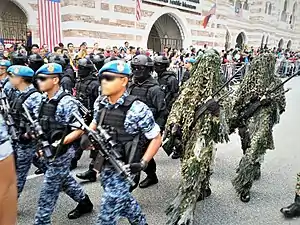
The special forces arm of the RMAF is known as PASKAU (a Malay acronym for Pasukan Khas Udara, which loosely translates as 'Special Air Service'). PASKAU was formed in response to a mortar attack by the then Communist Party of Malaya on a DHC-4 Caribou in the 1970s at the Kuala Lumpur Air Base. During peacetime, the unit is tasked with responding to aircraft hijacking incidents as well as protecting the country's numerous RMAF airbases and civilian airports. Its wartime roles include ground designation, sabotaging of enemy air assets and equipment and the defence of RMAF aircraft and bases. This unit is also deployed for counter-terrorism duties as well as Urban warfare/Close quarters combat.
- RMAF Provost Unit
This is the military police unit of the RMAF regiment, mandated to provide military police duties in RMAF airbases.
- RMAF Infantry
The unit that equipped with firearms for combat duties.
- RMAF Ground Air Defence Artillery
This regiment responsible for providing air defense protection by using Ground Base Air Defence (GBAD) to the important places such as airbases as well as RMAF asset.
Aerobatic team
The Kris Sakti (English: Magic Dagger) is the aerobatic display team of the Royal Malaysian Air Force. It made its debut on 2011 Langkawi International Maritime and Air Show in December 2011. They operated four Extra 300L aircraft.
Squadrons
| 1 Division |  |
2 Squadron |  |
Global Express, Boeing BBJ (737-700) | Subang AFB |
| 10 Squadron |  |
Eurocopter EC-725 | Kuantan AFB | ||
| 11 Squadron |  |
UAS | |||
| 12 Squadron |  |
Su-30MKM Flanker | Gong Kedak AFB | ||
| 15 Squadron |  |
BAE Hawk 108/208, Aermacchi MB-339CM | Butterworth AFB | ||
| 16 Squadron |  |
Beechcraft 200T | Subang AFB | ||
| 18 Squadron |  |
Boeing F/A-18D Hornet | Butterworth AFB | ||
| 20 Squadron |  |
Lockheed C-130H Hercules, KC-130T | Subang AFB | ||
| 21 Squadron |  |
CN235-220M, CN235-220M VIP | Subang AFB | ||
| 22 Squadron | 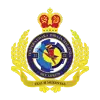 |
Airbus A400M | Subang AFB | ||
| 2 Division |  |
1 Squadron |  |
CN-235-220M | Kuching AFB |
| 5 Squadron | 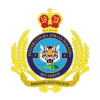 |
Eurocopter EC-725 | Labuan AFB | ||
| 6 Squadron |  |
BAE Hawk 108/Hawk 208 | Labuan AFB | ||
| 14 Squadron | 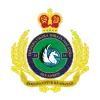 |
Lockheed C-130H Hercules | Labuan AFB | ||
| Training Division |  |
1 FTC |  |
PC-7 Mk II | Alor Setar AFB |
| 2 FTC |  |
EC-120B | Alor Setar AFB | ||
| 3 FTC | MB-339CM | Kuantan AFB | |||
Airfields/Airbases
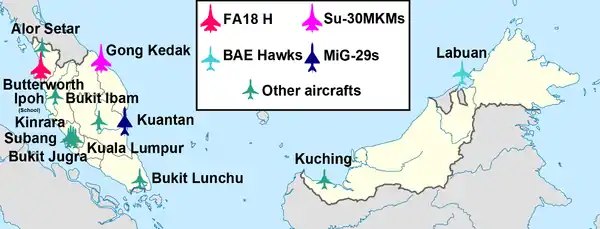
List:
- TUDM Butterworth, Penang (RMAF Butterworth), (Base of F/A-18 Hornets)
- TUDM Kuantan, Pahang (RMAF Kuantan)
- TUDM Gong Kedak, Kelantan (RMAF Gong Kedak) (Base of Su-30MKMs)
- TUDM Labuan, Sabah (RMAF Labuan) (Base of BAE Hawks)
- TUDM Kuala Lumpur (RMAF Kuala Lumpur)
- TUDM Subang, Selangor (RMAF Subang)
- TUDM Kuching, Sarawak (RMAF Kuching)
- TUDM Alor Setar, Kedah (RMAF Alor Setar) (Air Force Academy)
- TUDM Ipoh, Perak (RMAF Ipoh) (Air Force School)
- TUDM Bukit Lunchu, Johor (RMAF Bukit Lunchu) (Control and Reporting Post)
- TUDM Kinrara, Selangor (RMAF Kinrara) (School of Logistic Management; also houses a central hospital facility)
- TUDM Bukit Jugra, Selangor (RMAF Bukit Jugra) (PASKAU headquarters)
- TUDM Bukit Ibam, Pahang (RMAF Bukit Ibam)
Incidents and accidents
- Since 1989, around 95 armed forces personnel (most of those are the RMAF) have been killed in 18 crashes involving the ageing type American-made Sikorsky SH-3 Sea King (Nuri) helicopter.[16] This led the RMAF to purchase the French-made EC725 helicopter to replace it. But with the nation having ordered only 12 of a planned 28 EC725 helicopters as replacements, the RMAF was forced to prolong the life of its Sikorskys.[17] On 21 October 2016, it was reported that a Canadian helicopter company Heli-One will upgrade all Malaysia's Nuri helicopter.[18]
- In May 2008, two J85-GE-21 engines that power the Northrop F-5E Tiger II fighter jets belonging to the Royal Malaysian Air Force were reported missing, as of sometime in 2007, from an RMAF warehouse in Kuala Lumpur during Najib's tenure as Defence Minister in Abdullah Ahmad Badawi's cabinet. The jet engines belonged to the 12th Squadron (Scorpion) based in Butterworth. The issue became a matter of political dispute,[19] and it was reported a brigadier-general together with 40 other armed forces personnel had been sacked over the incident.[20] Further investigation led to the arrest of two RMAF personnel and a civilian contractor were charged in connection with the theft and disposal of both engines on 6 January 2010.[21] On 5 February 2010, Attorney-General Abdul Gani Patail revealed that the two missing engines had been found in Uruguay with the help of the Government of Uruguay and the Malaysian government is proceeding with the necessary measures to secure their return. Investigations showed that the engines were taken out of the RMAF base between 20 December 2007 to 1 January 2008 before being sent to a warehouse in Subang Jaya to be shipped out of Malaysia to South America.[22][23]
- On 26 February 2016, the RMAF Indonesian made-CN-325-220M version were forced to make an emergency landing into mangrove swamps near Kuala Selangor due to engine failure.[24] The aircraft co-pilot sustained a broken left arm during the incident while the rest of the crew managed to escape without major injuries. A fisherman who trying to help the crews out of the aircraft were reported drowned after his foot got stuck in a mud. The black box from the aircraft was found on the next day and sent to Bandung, Indonesia for analysing by Indonesian manufacturer over the cause of the accident.[25]
- On 21 December 2016, an American-made Beechcraft King Air 200T crashed into Butterworth airbase during its training mission from Subang airbase, killing one pilot while injuring three others.[26]
- On 14 June 2017, two pilots were killed after a British-made BAE Hawk (Mk 108) crashed at the Pahang - Terengganu border.[27] Previously, several other Hawks had crashed during training missions.[28]
Equipment
Present development
.jpg.webp)
To boost Malaysia's security in eastern Sabah from the threats of militants from the southern Philippines as well as to dispose of older inventory, the Royal Brunei Air Force (RBAF) agreed to transfer four of its S-70A Black Hawk to the RMAF.[29][30] BAE Hawk 208 squadrons have been stationed in various bases across East Malaysia in order to launch air-to-ground operations and attacks against foreign militants attempting intrusion into Sabah.[31] In 2016, BAE Systems entered into a strategic partnership with a Malaysian aviation maintenance, repair and overhaul (MRO) centre AIROD to upgrade the avionic systems on the Malaysian BAE Hawk aircraft.[32] As part of the Malaysia's Multi-Role Combat Aircraft (MRCA) program, Malaysia is looking to replace its ageing MiG-29 and F-5 fighters which have long since passed retirement age.[33][34] Due to financial difficulties, the plan was postponed year after year. Announcement of the winner of the project, as well as purchasing of the new generation fighters will most likely occur between 2016 and 2020.[35] The major contenders of this project would be the Boeing F/A-18E/F Super Hornet, Dassault Rafale, Eurofighter Typhoon, Saab JAS 39 Gripen, Sukhoi Su-30 and the Sukhoi Su-35.[35][36][37][38] While ATSC has launched a bid to upgrade the ageing MiG-29 fighters,[39] Dassault Rafale has offered a financial package with a ten-year repayment loan from a French commercial bank and guaranteed by the government of France to assist procurement of their fighter.[40] This offer was countered by BAE Systems' Eurofighter Typhoon and Saab JAS 39 Gripen which has offered competitive leasing deals instead.[33][41][42] EADS and BAE Systems has offered to set up joint venture companies for maintenance and repair of the aircraft if it is selected, along with competitive financial support extended by the UK government.[43] Beside promoting their jet fighters, Saab is pitching their airborne early warning and control aircraft, the Global Eye (Bombardier 6000) equipped with Erieye radar system and is looking for local partners in Malaysia for manufacturing and maintenance, repair and overhaul.[44]
Russia is ready to offer their jet fighters to meet Malaysia's requirements.[45] The Russian defence export corporation, Rosoboronexport which supplied the Royal Malaysian Air Force with Sukhoi Su-30MKM expressed its readiness to discuss the prospect of establishing joint and licensed production facilities in Malaysia.[46] The Russians have argued that despite some initial advantages especially in terms of meeting the high cost for maintenance, fuel, parts and insurance in the short term, the lessors the aircraft will require frequent checks to be assured that terms of the lease are upheld, and the aircraft will eventually have to be returned after the leasing period is up. As such, leasing fighter aircraft will have significant drawbacks in the defence of sovereignty of the nation.[38] Instead, the Russian offering their Sukhoi Su-35 at lower prices than their western rivals. However, according to the Malaysian Ministry of Defence, the race for new fighter jets has narrowed down to the Dassault Rafale and the Typhoon instead, the latter built by BAE Systems.[47]
In the late 2015, it was rumoured that Malaysia might purchase the Sino-Pakistani JF-17 Thunder,[48] but the report was denied by Malaysian Defence Minister and said they were still determining to choose.[49] It was believed that there was an immediate requirement for new fighters due to the increase of China's aggression in the South China Sea dispute.[50] Belarusian company also expressed their interest to help Malaysia to upgrade and repair their Russian-made fighter jets.[51] Following the visit of Saudi King in early 2017, Malaysia are reportedly seek to buy the excessive Royal Saudi Air Force (RSAF) jet fighters and helicopters.[52]
Following the visit by French President also in early 2017, Malaysia said they remain undecided whether to buy the French fighters although it has become the leader on the list of all jet fighters suggested,[53] with Malaysian Prime Minister Najib Razak assured the French President that they considering to buy.[54] The French government confirmed that negotiation is on the way although no final deal have yet been signed.[55]
In other hand Malaysia also in planned to acquire airborne early warning and control aircraft. Malaysia also urgently need to boost their maritime patrol capability with new Maritime Patrol Aircraft. Malaysia is reportedly considering an offer from Japan for P-3C Orion maritime patrollers if it can persuade the Japanese government to pay for the cost.[56] In July 2017, the plan to acquire new jet fighters were shelved by looking instead to upgrade its aerial surveillance capabilities to confront the growing threat of Islamist militants in the Southeast Asian region.[57]
In December 2017, the Royal Malaysian Air Force's Brigadier General Yazid Bin Arshad announced it had shortlisted four aircraft types to replace the force's ageing fleet of Beechcraft Super King Air maritime patrol aircraft. The selected types are the EADS CASA C-295 from Airbus, the P-8 Poseidon from Boeing, ATR 72 MP from ATR, a joint venture between Airbus and Leonardo, and the CASA/IPTN CN-235, which could be provided by either Airbus or Indonesian Aerospace, which acquired a licence to produce it. Brigadier General Yazid Bin Arshad added, however, that while "these four types are shortlisted, the door is not closed yet", indicating other options may still be possible.[58] On 7 January 2020, it is confirmed that the RMAF retired its Nuri or Sea King helicopters and remarked that there was an evaluation of a new utility helicopter to replace the Nuris.
See also
References
- Note: founded as Malayan Auxiliary Air force in 1936
- "Malaysian Armed Forces". Global Security. Archived from the original on 4 March 2016. Retrieved 1 March 2016.
- See Equipment of the Royal Malaysian Air Force
- "Fourth and Final A400M Delivered to Malaysia". Airheads Fly. 9 March 2017. Archived from the original on 10 March 2017. Retrieved 10 March 2017.
- "RMAF's two new copters arrive". Eurocopter Malaysia. Archived from the original on 21 February 2013. Retrieved 22 January 2015.
- "International Tender For Nuri Replacement To Open Soon". Bernama. 24 October 2007. Archived from the original on 24 January 2009. Retrieved 22 January 2015.
- "TUDM tunggu keputusan kerajaan ganti MiG-29N" (in Malay). Utusan Malaysia. 4 June 2009. Archived from the original on 9 January 2016. Retrieved 22 January 2015.
- "DSA 2010: Asia's Largest Defence and Security Exhibition Closes on a 'High' Despite Challenges (Ministry of Defence Malaysia signs RM10.355 billion contracts)". Defence Services Asia. April 2010. Archived from the original on 3 November 2010. Retrieved 22 January 2015.
- "Eurocopter likely to deliver 12 EC725 helicopters to Malaysia". Defense World. 21 April 2010. Archived from the original on 23 July 2011. Retrieved 22 January 2015.
- "Aerospace corp to set up copter centre in Subang". New Straits Times. 22 July 2010. Archived from the original on 22 June 2011. Retrieved 22 January 2015.
- John Gilbert (18 March 2014). "Three fighter jet makers to submit leasing bids". The Malaysian Reserve. Archived from the original on 19 August 2014. Retrieved 22 January 2015.
- Ridzwan, Rahmat (19 December 2017). "Malaysia discloses line of aircraft shortlisted for maritime patrol requirements". IHS Jane's 360. Archived from the original on 26 December 2017. Retrieved 26 December 2017.
- "Malaysia grounds a dozen 50-year-old Nuri helicopters". Bernama/zl(mn). 7 January 2020. Retrieved 8 January 2020.
- https://www.nst.com.my/news/nation/2020/01/553087/ackbal-abdul-samad-named-new-air-force-chief
- "History of RMAF". Blogger. 26 October 2009. Archived from the original on 6 March 2016. Retrieved 22 January 2015.
- "Nuri's 18th Crash In 39 Years". Bernama. 17 July 2007. Archived from the original on 22 August 2011. Retrieved 22 January 2015.
- Craig Hoyle (22 January 2015). "Malaysia to upgrade and arm S-61 "Nuri" fleet". Flightglobal. Archived from the original on 25 September 2015. Retrieved 22 January 2015.
- Greg Waldron (21 October 2016). "Malaysia S-61 upgrade gathers pace". Flightglobal. Archived from the original on 22 October 2016. Retrieved 21 October 2016.
- "Stolen engines case was covered up from the start". The Malaysian Insider. Archived from the original on 23 December 2009. Retrieved 22 December 2009.
- "PM: Fighter jet engine reported stolen to cops". The Star. 12 December 2009. Archived from the original on 21 June 2011. Retrieved 22 December 2009.
- "Two Malaysian Indians charged with aircraft engine theft". India: Deccan Herald. 6 January 2010. Archived from the original on 2 August 2010. Retrieved 7 January 2010.
- "Missing jet engines found". The Star. 5 February 2010. Archived from the original on 21 June 2011. Retrieved 6 February 2010.
- A. Trucido Y R. Rossello. "El enigma de los motores de F-5 robados" (in Spanish). El Pais. Archived from the original on 12 November 2013. Retrieved 6 February 2010.
- Ridzwan Rahmat (25 February 2016). "Malaysian Air Force CN-235 crash lands near Kuala Selangor". IHS Jane's 360. Archived from the original on 26 February 2016. Retrieved 26 February 2016.
- "RMAF to send flight recorder to Bandung for analysis by manufacturer". The Star. 1 March 2016. Archived from the original on 3 March 2016. Retrieved 1 March 2016.
- "1 killed, 3 injured in Malaysian military plane crash at Butterworth base". Bernama. Channel NewsAsia. 21 December 2016. Archived from the original on 22 December 2016. Retrieved 22 December 2016.
- "Malaysia Air Force says crew of missing fighter jet killed in crash". The Star/Asia News Network. The Straits Times. 15 June 2017. Archived from the original on 17 June 2017. Retrieved 16 June 2017.
- "Chronology of RMAF Hawk jet crashes". New Straits Times. 15 June 2017. Retrieved 16 June 2017.
- Marcel Burger (23 January 2015). "Brunei gives four Black Hawks as present to Malaysia". AIRheads. Archived from the original on 24 January 2015. Retrieved 24 January 2015.
- "Brunei transfers S-70A Blackhawks to Malaysian Armed Forces". Borneo Bulletin. 29 January 2015. Archived from the original on 31 March 2016. Retrieved 19 April 2016.
- "New infantry battalion to boost RMAF presence in Labuan". Bernama. The Malay Mail. 3 March 2015. Archived from the original on 7 August 2016. Retrieved 22 April 2016.
- "BAE Systems and AIROD partner to upgrade RMAF Hawk Aircraft". airforce-technology.com. 21 April 2016. Archived from the original on 30 May 2016. Retrieved 22 April 2016.
- "Saab Offers Lease Package For Gripen Jets". Bernama. Malaysian Digest. 19 April 2016. Archived from the original on 20 April 2016. Retrieved 19 April 2016.
- Bradley Perrett (16 February 2016). "Malaysian Mig-29 and F-5 Decisions in 2016?". Aviation Week Network. Archived from the original on 13 May 2016. Retrieved 19 April 2016.
- Bradley Perrett (23 March 2015). "Malaysia Expected To Order Fighters In 2016-20". Aviation Week Network. Archived from the original on 13 May 2016. Retrieved 19 April 2016.
- Praveen Menon; Muralikumar Anantharaman (18 March 2015). "Boeing pins hopes on Malaysia order for boost to F/A-18 fighter jet". Reuters. Archived from the original on 5 May 2016. Retrieved 19 April 2016.
- "Russian weapons still have high export potential in Malaysia". Rostec. 14 April 2016. Archived from the original on 21 April 2016. Retrieved 19 April 2016.
- "Why Russia's Su-35 must re-enter the Malaysian dogfight". Russia Beyond the Headlines. Big News Network. 22 April 2016. Archived from the original on 13 May 2016. Retrieved 27 April 2016.
- Nigel Pittaway (28 March 2015). "Malaysian Company Proposes MiG-29 Upgrade". Defense News. Retrieved 19 April 2016.
- "Malaysia Offered Similar Financial Package As Egypt For Rafale Procurement". Bernama. 18 March 2015. Retrieved 19 April 2016.
- "BAE to offer Eurofighter lease to Malaysia". Australian Aviation. 23 February 2014. Archived from the original on 8 June 2014. Retrieved 19 April 2016.
- Jon Grevatt (19 April 2016). "Saab looks to Gripen lease to kickstart Malaysia's MRCA programme". IHS Jane’s 360. Archived from the original on 20 April 2016. Retrieved 19 April 2016.
- Jon Grevatt (18 April 2016). "DSA 2016: BAE Systems outlines Typhoon offset package for Malaysia". IHS Jane’s 360. Archived from the original on 19 April 2016. Retrieved 19 April 2016.
- Tim Fish (22 April 2016). "DSA 2016: Eyeing up Malaysia". Shephard. Archived from the original on 23 April 2016. Retrieved 22 April 2016.
- "Russia's positions on Asia-Pacific arms market". Tass. 19 April 2016. Retrieved 19 April 2016.
- "Russian company ready to discuss joint and licensed production facilities in Malaysia". Bernama. The Sun. 19 April 2016. Retrieved 19 April 2016.
- "Rafale appears in the lead as Malaysia seeks new fighter jets". The Star. Reuters. 23 March 2017. Archived from the original on 28 March 2017. Retrieved 28 March 2017.
- Benjamin David Baker (23 December 2015). "The Sino-Pakistani JF-17 Might Have Another Buyer in Asia". The Diplomat. Archived from the original on 2 March 2016. Retrieved 19 April 2016.
- Usman Ansari (22 December 2015). "Malaysia Denies Interest in JF-17, But Export Hopes Remain". Defense News. Retrieved 19 April 2016.
- "In China's shadow, Southeast Asia looks to replace ageing fighter jets". The Star. Reuters. 22 April 2016. Archived from the original on 24 April 2016. Retrieved 22 April 2016.
- "Belarusian company to repair more military aircraft for Malaysia". Belarusian Telegraph Agency. 21 December 2016. Retrieved 22 December 2016.
- "Malaysia Eyes Buying Excess Aircraft From Saudi Arabia". Defense World. 2 March 2017. Archived from the original on 3 March 2017. Retrieved 3 March 2017.
- Rozanna Latiff; Praveen Menon; Simon Cameron-Moore; Michael Perry (28 March 2017). "Malaysian PM tells France not ready to decide on buying Rafale jets". Reuters. Archived from the original on 28 March 2017. Retrieved 28 March 2017.
- "Malaysia considering buying French fighter jet Rafale". The Star. 29 March 2017. Archived from the original on 29 March 2017. Retrieved 29 March 2017.
- Jean-Baptiste Vey; Adrian Croft; Paul Sandle; John Irish (30 March 2017). "Malaysia only talking to Dassault about fighter purchase - French government". Channel NewsAsia. Reuters. Archived from the original on 1 April 2017. Retrieved 1 April 2017.
- "Malaysia Considers Surplus Japanese Orions". Aerospace Daily & Defense Report. Aviation Week Network. 28 March 2017. Archived from the original on 28 March 2017. Retrieved 28 March 2017.(subscription required)
- "Malaysia shelves plans to buy fighter jets". Khmer Times. Reuters. 14 July 2017. Retrieved 3 January 2018.
- Ridzwan, Rahmat (19 December 2017). "Malaysia discloses line of aircraft shortlisted for maritime patrol requirements". IHS Jane's 360. Archived from the original on 26 December 2017. Retrieved 26 December 2017.
External links
| Wikimedia Commons has media related to Royal Malaysian Air Force. |
.svg.png.webp)